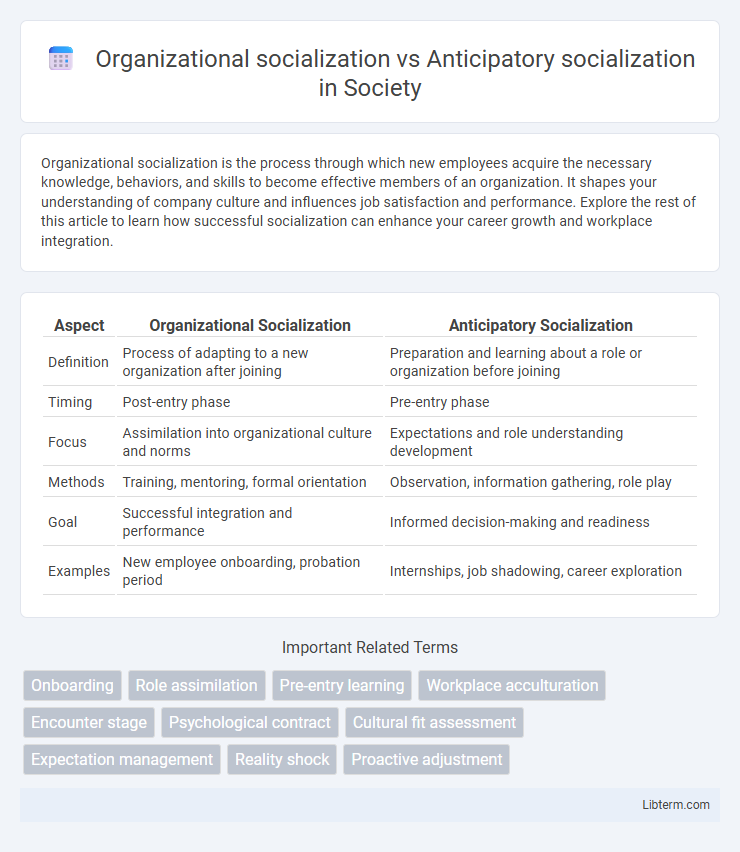Organizational socialization is the process through which new employees acquire the necessary knowledge, behaviors, and skills to become effective members of an organization. It shapes your understanding of company culture and influences job satisfaction and performance. Explore the rest of this article to learn how successful socialization can enhance your career growth and workplace integration.
Table of Comparison
| Aspect | Organizational Socialization | Anticipatory Socialization |
|---|---|---|
| Definition | Process of adapting to a new organization after joining | Preparation and learning about a role or organization before joining |
| Timing | Post-entry phase | Pre-entry phase |
| Focus | Assimilation into organizational culture and norms | Expectations and role understanding development |
| Methods | Training, mentoring, formal orientation | Observation, information gathering, role play |
| Goal | Successful integration and performance | Informed decision-making and readiness |
| Examples | New employee onboarding, probation period | Internships, job shadowing, career exploration |
Introduction to Socialization Processes
Organizational socialization involves the process by which new employees learn the attitudes, knowledge, skills, and behaviors required to succeed within an organization, while anticipatory socialization occurs before joining, where individuals form expectations and attitudes about a future organizational role. These socialization processes influence employee adjustment, role clarity, and job satisfaction, impacting retention and performance outcomes. Effective socialization strategies reduce uncertainty and enhance role innovation by aligning individual values with organizational culture.
Defining Organizational Socialization
Organizational socialization is the process by which new employees acquire the necessary knowledge, behaviors, and cultural norms to effectively integrate into a company's work environment. This socialization phase involves learning explicit job roles, unwritten organizational values, and social networks that influence workplace behavior. Anticipatory socialization, by contrast, occurs before employment begins, encompassing the expectations and information individuals gather about an organization to prepare for future roles.
Understanding Anticipatory Socialization
Anticipatory socialization involves the process individuals undergo before entering a new organizational role, where they acquire knowledge, skills, and attitudes to prepare for future job expectations. It shapes their perceptions and behaviors by gathering information through formal education, internships, networking, and media about organizational culture and role demands. This proactive learning helps reduce role ambiguity and facilitates smoother adjustment during the subsequent organizational socialization phase.
Key Differences Between Organizational and Anticipatory Socialization
Organizational socialization occurs after an individual joins an organization, focusing on learning specific job roles, organizational culture, and internal processes, whereas anticipatory socialization happens before employment and involves forming expectations about the job, work environment, and organizational norms. Key differences include timing--organizational socialization takes place post-hire, anticipatory socialization pre-hire--and purpose, with organizational socialization aiming at integration and role mastery, while anticipatory socialization centers on preparation and expectation setting. The sources of socialization also differ, as organizational socialization is guided by formal training and workplace interactions, whereas anticipatory socialization relies on external information such as media, social networks, and prior experiences.
Stages of Organizational Socialization
Organizational socialization consists of three key stages: anticipatory socialization, encounter, and change/acquisition. Anticipatory socialization occurs before joining the organization, where individuals gather information and develop expectations about the work environment and role. The encounter stage involves facing the realities of the job and organizational culture, while the change and acquisition stage focuses on mastering required skills, adjusting attitudes, and becoming an effective organizational member.
Phases of Anticipatory Socialization
Anticipatory socialization consists of two key phases: vocational and organizational socialization. The vocational phase involves learning about various careers and acquiring the necessary skills and attitudes before entering the workforce. The organizational phase focuses on gathering detailed information about a specific organization and its culture prior to employment, facilitating smoother adjustment upon entry.
Impacts on Employee Adjustment and Performance
Organizational socialization shapes employee adjustment by providing formal training, role clarification, and cultural immersion, leading to higher job satisfaction and enhanced performance. Anticipatory socialization influences expectations and attitudes before joining, affecting initial commitment and easing the transition into the organization. Effective integration of both socialization types results in faster acclimatization, reduced turnover, and improved long-term productivity.
Factors Influencing Each Socialization Type
Organizational socialization is influenced by factors such as organizational culture, social networks within the workplace, and formal onboarding processes that help new employees adapt to their roles. Anticipatory socialization depends largely on prior experiences, education, and the information gathered through vocational anticipatory socialization, including media, family, and peer groups that shape expectations before entering the organization. Both processes are shaped by individual characteristics like personality and motivation, but organizational socialization emphasizes internal adaptation, whereas anticipatory socialization centers on external preparation.
Organizational Strategies for Effective Socialization
Organizational strategies for effective socialization include structured onboarding programs that distinguish between anticipatory socialization, where candidates gather information and form expectations pre-entry, and organizational socialization, which focuses on adapting new hires to company culture and roles post-entry. Utilizing mentorship and realistic job previews enhances anticipatory socialization, reducing role ambiguity and improving early performance. Continuous feedback and social integration activities during organizational socialization foster commitment, satisfaction, and retention.
Conclusion: Integrating Both Socialization Processes
Integrating organizational socialization and anticipatory socialization enhances employee adaptation by combining pre-entry expectations with real-time organizational experiences. This approach optimizes role clarity, cultural alignment, and job satisfaction, leading to improved performance and retention. Effective onboarding strategies leverage insights from both processes to create seamless transitions and foster long-term commitment.
Organizational socialization Infographic

 libterm.com
libterm.com